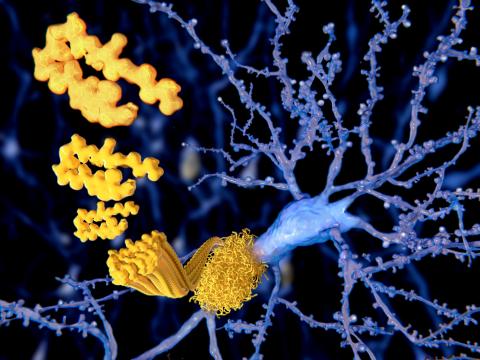Reactions: study suggests elite footballers more likely to develop dementia
Swedish research involving more than 6,000 male footballers in the country's top division (between 1924 and 2019) indicates that they were 1.5 times more likely to develop a neurodegenerative disease compared to the population analysed who were not involved in professional football. Unlike outfield players, goalkeepers did not have this increased risk, which, according to the authors, supports the hypothesis that impacts to the head when striking the ball could explain the increased risk. The study is published in The Lancet Public Health.

Marc Suárez - futbolistas EN
Marc Suárez-Calvet
Researcher at the Barcelonabeta Brain Research Center and the Neurology Service of the Hospital del Mar (Barcelona)
Several studies have shown that sports involving repeated blows to the head (such as boxing, rugby or ice hockey) may increase the risk of dementia or neurodegenerative disease. In the case of football, the most popular sport, some evidence also points to this association, although the results of studies to date have been inconsistent.
The study recently published in The Lancet Public Health follows 6,007 footballers who played in the Swedish top division between 1924 and 2019 and concludes that they are 1.5 times more at risk of neurodegenerative disease than the general population. Specifically, 8.9% of the football players developed a neurodegenerative disease, a significantly higher percentage than the general population (6.2%). The risk of Alzheimer's disease or other dementias was significantly increased in football players, while there were no differences in the risk of other diseases, such as Parkinson's disease or amyotrophic lateral sclerosis. Considering that physical exercise is a protective factor for the development of any type of dementia, this association may even be underestimated.
A very important finding of the study is that this increased risk does not occur in the 510 goalkeepers studied, who tend to hit the ball less with their heads, but in the rest of the players. This could indicate that repeated headers are responsible for the increased risk of Alzheimer's and neurodegenerative diseases. However, it should be remembered that a cause-effect relationship cannot be established in an observational study. An important limitation of the study is that only men have been studied, studies should also be carried out in women.
This study (and others with similar results) has important implications. They should make us reflect on the need to minimise repeated head-butting and head-butting in sport, even if it is of low intensity. This is especially important in childhood and adolescence, where the brain is still developing.
Fútbol - Sánchez Valle
Raquel Sánchez-Valle
Head of the Neurology Department at Hospital Clínic de Barcelona and secretary of the Spanish Society of Neurology's Study Group on Behaviour and Dementia
This is an epidemiological study of a large number of cases and controls, with quality methodology in this context. Clinical diagnoses were obtained from codes from death certificates, hospital diagnostic codes and use of specific medication that were available from different dates, so there is not a complete coverage of the whole period. Diagnostic coding has its limitations, especially in older data, as it is not detailed. Death certificates may omit the diagnosis of neurodegenerative disease "as a cause of death" on some occasions, especially in older registries where the impact of these diseases as a cause of death was minimised. It is not specified whether primary care data have been included. This could in any case minimise the frequency of neurodegenerative diseases, albeit similarly in cases and controls. On the other hand, a study based on diagnostic codes does not allow clinical details to be obtained in the same way as a review of medical records, but because of the ambition of the project at the numerical level it would have been very difficult to obtain.
This study is in line with others published in professional footballers that show an increase in overall neurodegenerative diseases, even though they usually have a lower level of cardiovascular risk factors - in this study cardiovascular mortality was similar, that attributable to smoking was lower. The risk of some of the diseases is somewhat lower and there is no increased risk of Parkinson's disease or ALS. These differences could have different reasons, including some discussed by the authors themselves, that because professionalisation in Swedish football was later than in other countries, exposure to trauma may have been less intense or prolonged.
In terms of practical implications, both the United States and the United Kingdom have taken steps to minimise head injuries in children by limiting the use of overhead kicks or modifying the type of ball. However, it is unclear whether the damage from repeated head injuries comes from head kicks or whether it is the higher intensity unintentional impacts - such as being hit by a ball or collisions between players that sometimes result in concussions - that are the main cause of the damage, Therefore, the need to use other preventive measures -such as the use of helmets-, to establish strict "punitive" protocols for aggressive play that could lead to this type of trauma or to withdraw from the game, rest and monitoring of players who have suffered a concussion, is under discussion.
The progressive professionalisation of football from an increasingly younger age and the possible increased aggressiveness on the pitch do not suggest that the risk has been significantly reduced so far.
Peter Ueda et al.
- Research article
- Peer reviewed
- Observational study
- People



